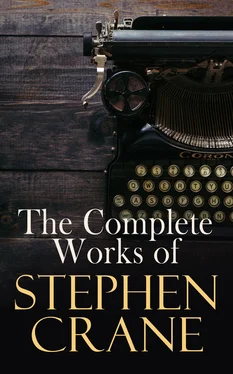His mode changed directly. He began to sing popular airs with enthusiasm. He congratulated his companions upon being in his society. They were excited by his frenzy. They began to fraternize in jovial fashion. It was understood that they were true and tender spirits. They had come away from a grinding world filled with men who were harsh.
When one of them chose to divulge some place where the world had pierced him, there was a chorus of violent sympathy. They rejoiced at their temporary isolation and safety.
Once a man, completely drunk, stumbled along the floor of the saloon. He opened the door of the little room and made a show of entering. The men sprang instantly to their feet. They were ready to throttle any invader of their island. They elbowed each other in rivalry as to who should take upon himself the brunt of an encounter.
‘Oh!’ said the drunken individual, swaying on his legs and blinking at the party’ oh! thish private room?’
‘That’s what it is, Willie,’ said Jones. ‘An’ you git outa here, er we’ll throw yeh out.’
‘That’s what we will,’ said the others.
‘Oh!’ said the drunken man. He blinked at them aggrievedly for an instant and then went away.
They sat down again. Kelcey felt in a way that he would have liked to display his fidelity to the others by whipping the intruder.
The bar-tender came often. ‘Gee, you fellahs er tanks!’ he said in a jocular manner, as he gathered empty glasses and polished the table with his little towel.
Through the exertions of Jones, the little room began to grow clamorous. The tobacco smoke eddied about the forms of the men in ropes and wreaths. Near the ceiling there was a thick gray cloud.
Each man explained in his way that he was totally out of place in the before-mentioned world. They were possessed of various virtues, which were unappreciated by those with whom they were commonly obliged to mingle—they were fitted for a tree-shaded land, where everything was peace.
Now that five of them had congregated, it gave them happiness to speak their inmost thoughts without fear of being misunderstood.
As he drank more beer Kelcey felt his breast expand with manly feeling. He knew that he was capable of sublime things. He wished that some day one of his present companions would come to him for relief. His mind pictured a little scene. In it he was magnificent in his friendship.
He looked upon the beaming faces and knew that if at that instant there should come a time for a great sacrifice he would blissfully make it. He would pass tranquilly into the unknown, or into bankruptcy, amid the ejaculations of his companions upon his many virtues.
They had no bickerings during the evening. If one chose to momentarily assert himself, the others instantly submitted.
They exchanged compliments. Once old Bleecker stared at Jones for a few moments. Suddenly he broke out:
‘Jones, you’re one of the finest fellows I ever knew!’
A flush of pleasure went over the other’s face, and then he made a modest gesture, the protest of a humble man.
‘Don’t flimflam me, of boy,’ he said with earnestness.
But Bleecker roared that he was serious about it.
The two men arose and shook hands emotionally. Jones butted against the table and knocked off a glass.
Afterward a general hand-shaking was inaugurated. Brotherly sentiments flew about the room. There was an uproar of fraternal feeling.
Jones began to sing. He beat time with precision and dignity. He gazed into the eyes of his companions, trying to call music from their souls. O’Connor joined in heartily, but with another tune. Off in a corner old Bleecker was making a speech.
The bar-tender came to the door. ‘Gee, you fellahs er making a row. It’s time fer me t’ shut up th’ front th’ place, an’ you mugs better sit on yerselves. It’s one o’clock.’
They began to argue with him. Kelcey, however, sprang to his feet. ‘One o’clock?’ he said. ‘Holy smoke, I mus’ be flyin’!’
There came protesting howls from Jones. Bleecker ceased his oration.
‘My dear boy—’ he began.
Kelcey searched for his hat.
‘I’ve gota go t’ work at seven,’ he said.
The others watched him with discomfort in their eyes.
‘Well,’ said O’Connor, ‘if one goes we might as well all go.’
They sadly took their hats and filed out.
The cold air of the street filled Kelcey with vague surprise. It made his head feel hot. As for his legs, they were like willow-twigs.
A few yellow lights blinked. In front of an all-night restaurant a huge red electric lamp hung and sputtered. Horse-car bells jingled far down the street. Overhead a train thundered on the elevated road.
On the sidewalk the men took fervid leave. They clutched hands with extraordinary force, and proclaimed, for the last time, ardent and admiring friendships.
When he arrived at his home Kelcey proceeded with caution. His mother had left a light burning low. He stumbled once in his voyage across the floor. As he paused to listen he heard the sound of little snores coming from her room.
He lay awake for a few moments and thought of the evening. He had a pleasurable consciousness that he had made a good impression upon those fine fellows. He felt that he had spent the most delightful evening of his life.
CHAPTER V
Kelcey was cross in the morning. His mother had been obliged to shake him a great deal, and it had seemed to him a most unjust thing. Also, when he, blinking his eyes, had entered the kitchen, she had said: ‘Yeh left th’ lamp burnin’ all night last night, George. How many times must I tell yeh never t’ leave th’ lamp burnin’?’
He ate the greater part of his breakfast in silence, moodily stirring his coffee, and glaring at a remote corner of the room with eyes that felt as if they had been baked. When he moved his eyelids there was a sensation that they were cracking. In his mouth there was a singular taste. It seemed to him that he had been sucking the end of a wooden spoon. Moreover, his temper was rampant within him. It sought something to devour.
Finally he said savagely: ‘Damn these early hours!’
His mother jumped as if he had flung a missile at her. ‘Why, George—’ she began.
Kelcey broke in again. ‘Oh, I know all that; but this gettin’ up in th’ mornin’ so early makes me sick. Jest when a man is gettin’ his mornin’ nap he’s gota get up. I—’
‘George, dear,’ said his mother, ‘yeh know how I hate yeh t’ swear, dear. Now, please don’t.’ She looked beseechingly at him.
He made a swift gesture. ‘Well, I ain’t swearin’, am I?’ he demanded. ‘I was on’y sayin’ that this gettin’-up business gives me a pain, wasn’t I?’
Well, yeh know how swearin’ hurts me,’ protested the little old woman. She seemed about to sob. She gazed off retrospectively. She apparently was recalling persons who had never been profane.
‘I don’t see where yeh ever caught this way ‘a swearin’ out at everything,’ she continued presently. ‘Fred, ner John, ner Willie never swore a bit. Ner Tom neither, except when he was real mad.’
The son made another gesture. It was directed into the air, as if he saw there a phantom injustice. ‘Oh, good thunder!’ he said, with an accent of despair. Thereupon he relapsed into a mood of silence. He sombrely regarded his plate.
This demeanour speedily reduced his mother to meekness. When she spoke again it was in a conciliatory voice. ‘George, dear, won’t yeh bring some sugar home t’-night?’ It could be seen that she was asking for a crown of gold.
Kelcey aroused from his semi-slumber.
‘Yes, if I kin remember it,’ he said.
The little old woman arose to stow her son’s lunch into the pail. When he had finished his breakfast he stalked for a time about the room in a dignified way. He put on his coat and hat, and, taking his lunch-pail, went to the door. There he halted, and without turning his head, stiffly said:
Читать дальше












